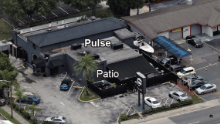The autopsy of the gunman who massacred 49 people in a Florida nightclub attack last month revealed he was HIV-negative and likely a long-term user of steroids, two U.S. law enforcement officials said.
The revelation comes as FBI agents continue to scour the background of Omar Mateen for clues as to why he carried out his June 12 rampage at Orlando's Pulse nightclub.
The 29-year-old had pledged allegiance to Islamic State militants during his attack, FBI officials have said.
Law enforcement officials also said the FBI has found no evidence so far that Mateen chose the popular establishment because of its gay clientele.
"While there can be no denying the significant impact on the gay community, the investigation hasn't revealed that he targeted Pulse because it was a gay club," a law enforcement official said.
A month later, though, a complete picture of what motivated Mateen remains murky and may never be known because he was killed in a shootout with police and did not leave a manifesto. Officials said there is no evidence thus far that Mateen was gay or that his attack was motivated by a distaste for gays.
Federal investigators are not sure whether steroids played a role in the shooting. A medical examiner found evidence of physical changes in Mateen's body that were consistent with long-term steroid use, the officials said, and is seeking to confirm that assessment through further testing.
The National Institute on Drug Abuse reports on its website that using high doses of steroids, which help build body mass and muscle, "increase irritability and aggression. Some steroid abusers report that they have committed aggressive acts, such as physical fighting or armed robbery, theft, vandalism, or burglary."
A spokesman for the Orange County, Fla., medical examiner declined to comment on the preliminary findings.
"Whether or not an individual used steroids can be determined through specimen tests," Carrie Proudfit, the spokesman, wrote in an email. "Toxicology reports would reflect those results. They'll be made available to law enforcement."
Proudfit referred further questions to the FBI. Bureau spokesman Carol Cratty declined to comment.
The results, if confirmed through further testing, would not be entirely surprising. Mateen's ex-wife, Sitora Yusufiy, told reporters shortly after the shooting that the former security guard had a history of steroid use. A former co-worker of Mateen's told CBS News that the gunman told him in 2006 that he had started using steroids.
The law enforcement officials also disclosed that the autopsy determined that Mateen did not have HIV.
On June 21, Spanish-language television network Univision aired a report in which "Miguel," a man wearing a disguise to conceal his identity, alleged that he had sex with Mateen after meeting him on a gay-dating app. Miguel said Mateen had sex with other men, too, including a three-way encounter with a Puerto Rican who allegedly told Mateen, after unprotected sex with him, that he was HIV-positive.
Several Pulse regulars also have claimed to have seen Mateen at the club or to have been contacted by him on the gay dating apps Grindr, Jack'd and Adam4Adam.
The FBI, however, has been unable to find evidence to corroborate such claims. Agents have failed to find any photographs, text messages, smartphone apps, gay pornography or cell-tower location data that suggest that Mateen -- who was twice married to women and had a young son -- had a secret gay life, law enforcement officials have said.
Officials said there is nothing to suggest that he attempted to cover his tracks by deleting files. They also added he did not make gay slurs during the shooting inside the club, based on witness accounts.
Separately, federal officials announced Friday that the Justice Department will review the Orlando Police Department's response to the massacre.
The Justice Department's Office of Community Oriented Policing Services -- which provides grant funding and technical assistance to help advance community policing initiatives across the country -- will conduct what it called a "comprehensive after-action assessment" of the Police Department's actions. In a statement, Community Oriented Policing Services Director Ronald Davis said Orlando Police Chief John Mina had asked for the assessment, which might help other agencies.
"The lessons learned from this independent, objective and critical review of such a high-profile incident will benefit not only the Orlando Police Department and its community; it will also serve to provide all law enforcement critical guidance and recommendations for responding to future such incidents," Davis said in a statement.
It is not uncommon for police departments to ask for reviews of their responses after mass shootings, in the hopes that independent reviews can produce lessons that prevent or otherwise help shape the response to such attacks in the future.
The Justice Department said in a statement that its Community Oriented Policing Services would be conducting the review as part of its assistance program.
Information for this article was contributed by Del Quentin Wilber of Tribune News Service and by Adam Goldman, Anne Hull and Matt Zapotosky of The Washington Post.
A Section on 07/16/2016


